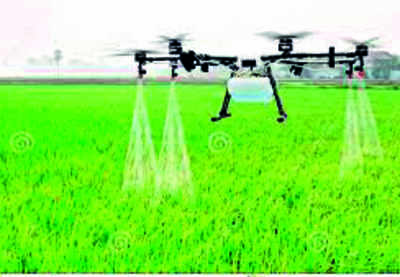
The University of Agricultural Sciences is working on using drones for spraying pesticides and insecticides and experiments have already started in the university’s soybean plot.
Dharwad: The University of Agricultural Sciences is working on the use of drones for spraying pesticides and insecticides and experiments have started in the university’s soybean plot. UAS scientists say the move is to limit water use, accuracy in reaching plants and protect plants from damage caused by chemicals.
Already they are using a drone on an experimental basis in soybean fields in the UAS campus and a drone carrying 20 liters of pesticides has sprayed the pesticide. The project is being run under the sponsorship of Pune-based Syngenta India Limited Company, which deals in pesticides, seeds and other remote ingredients. Lead researcher DN Kambrekar is overseeing the project.
precision farming
Kambreaker said that the experiment has been done under the precision farming scheme. With the use of drones that have become an integral part of farming, it will be possible to identify the infected part of the field and spray insecticides/pesticides on the affected crops only. He said that the project is still in the pilot phase.
To compare the advantages and disadvantages of the experiment, one part of soybean and paddy plots has been sprayed with insecticide from drones, while the other part has been sprayed using manpower. “We will be able to compare the effect of these two methods,” Kambrecker said.
“Typically, about 200 ml of insecticide is mixed in 500 liters of water for spraying one hectare of land. But when we use drones for spraying, we mix 200 ml of insecticide in 20 liters of water. The drone, flying three meters above the ground, sprays insecticides from top to bottom of the plant. Since the insecticide is of high density, the pest will be controlled in no time. But we are also seeing how safe it is for the overall development of the crop,” Kambrekar said.
five minutes to an acre
It took five minutes for the drone to spray an acre of land. If the pesticide or battery runs out or if a technical fault develops, the technology is in place to ensure the drone is returned to the operator.
FacebookTwitterLinkedinE-mail
.